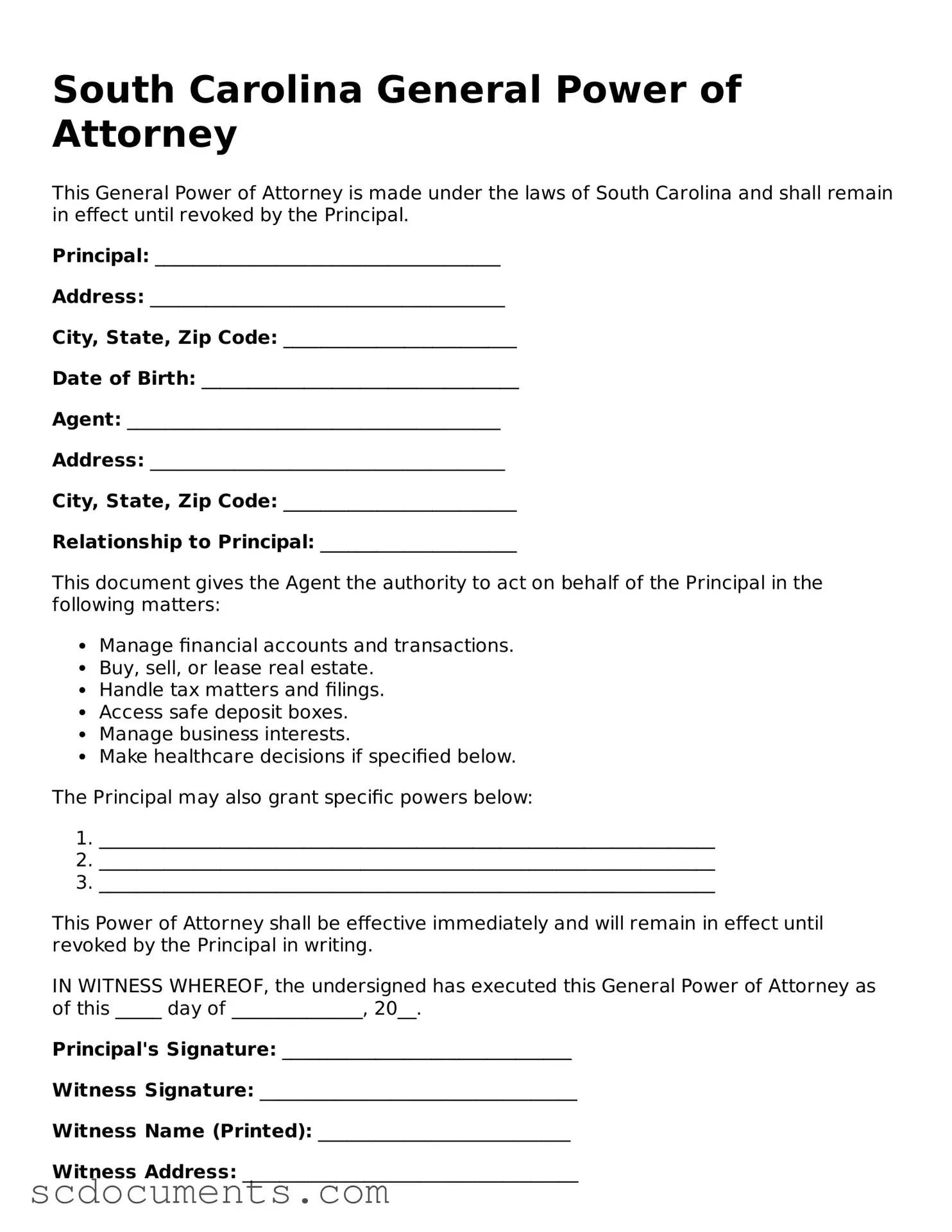Legal South Carolina General Power of Attorney Form
Dos and Don'ts
When filling out the South Carolina General Power of Attorney form, it is important to follow certain guidelines to ensure that the document is valid and serves its intended purpose. Here are some dos and don'ts to consider:
- Do clearly identify the principal and the agent in the form.
- Do specify the powers you are granting to the agent.
- Do sign the document in the presence of a notary public.
- Do keep a copy of the signed form for your records.
- Don't leave any sections blank; fill in all required information.
- Don't use vague language that could lead to confusion about the powers granted.
- Don't sign the form if you do not fully understand the implications of the powers you are granting.
File Data
| Fact Name | Description |
|---|---|
| Definition | A General Power of Attorney in South Carolina allows one person to grant another person the authority to make decisions on their behalf, covering a wide range of financial and legal matters. |
| Governing Law | The South Carolina General Power of Attorney is governed by the South Carolina Code of Laws, specifically Title 62, Chapter 5. |
| Durability | This form can be durable, meaning it remains effective even if the principal becomes incapacitated, unless otherwise stated. |
| Revocation | The principal can revoke the General Power of Attorney at any time, provided they are competent to do so. |
Documents used along the form
When creating a General Power of Attorney in South Carolina, several other forms and documents may be useful to ensure that your intentions are clearly communicated and legally binding. Each of these documents serves a specific purpose and can help streamline the management of your affairs.
- Durable Power of Attorney: This document remains effective even if you become incapacitated. It grants your agent the authority to make decisions on your behalf when you cannot.
- Healthcare Power of Attorney: This form allows you to designate someone to make medical decisions for you if you are unable to do so. It focuses specifically on health-related matters.
- Living Will: A living will outlines your preferences regarding medical treatment in situations where you are terminally ill or incapacitated. It guides healthcare providers and your agent in making decisions that align with your wishes.
- Financial Power of Attorney: This document grants authority specifically for financial matters, allowing your agent to handle banking, investments, and other financial transactions on your behalf.
- Real Estate Power of Attorney: If you need someone to manage or sell property on your behalf, this form gives them the legal authority to do so, focusing on real estate transactions.
- Affidavit of Identity: This document can be used to verify your identity and the authority of your agent. It can be helpful in situations where proof of identity is required.
- Notice of Revocation: Should you decide to revoke the power granted in your General Power of Attorney, this document formally notifies your agent and any relevant third parties.
- Power of Attorney form for Georgia: This document allows you to designate someone to act on your behalf in various matters. For more information, visit georgiapdf.com/power-of-attorney/.
- Agent Acknowledgment Form: This form confirms that your agent understands their responsibilities and agrees to act in your best interest, providing clarity and accountability.
Understanding these additional forms can enhance the effectiveness of your General Power of Attorney. Each document plays a crucial role in ensuring your wishes are respected and your affairs are managed according to your preferences.
Key takeaways
Filling out and utilizing the South Carolina General Power of Attorney (POA) form can be a straightforward process when you understand its key components. Here are some essential takeaways to consider:
- Purpose of the POA: A General Power of Attorney allows you to designate someone to make decisions on your behalf, particularly in financial matters.
- Choosing an Agent: Select a trustworthy individual as your agent, as they will have significant authority over your financial affairs.
- Durability: In South Carolina, the POA can be made durable, meaning it remains effective even if you become incapacitated.
- Specific Powers: Clearly outline the powers you are granting. The form provides options for specific actions, such as managing bank accounts or selling property.
- Signatures Required: Ensure that you sign the document in the presence of a notary public. This step is crucial for the POA to be legally binding.
- Revocation: You can revoke the General Power of Attorney at any time, as long as you are mentally competent to do so.
- Record Keeping: Keep a copy of the signed POA in a safe place and provide copies to your agent and any relevant institutions.
- Consultation Recommended: While not required, consulting with a legal professional can help clarify any uncertainties about the powers you are granting.
Understanding these key points can help ensure that the process of filling out and using the South Carolina General Power of Attorney form is smooth and effective.
Other South Carolina Templates
Dnr Do Not Resuscitate - Healthcare providers are required to check for a DNR order when a patient is brought in for emergency care.
In order to efficiently navigate the process of correcting any discrepancies concerning your vehicle's title, it is imperative to utilize the Missouri 5177 form alongside relevant resources. This form not only aids in updating vital ownership details but also ensures compliance with state regulations. To facilitate this process, you can find additional resources and guidance through All Missouri Forms, making it easier to complete your requirements with confidence.
Sc Dnr Boat Registration - It may be used to document sales between private individuals and dealerships.
